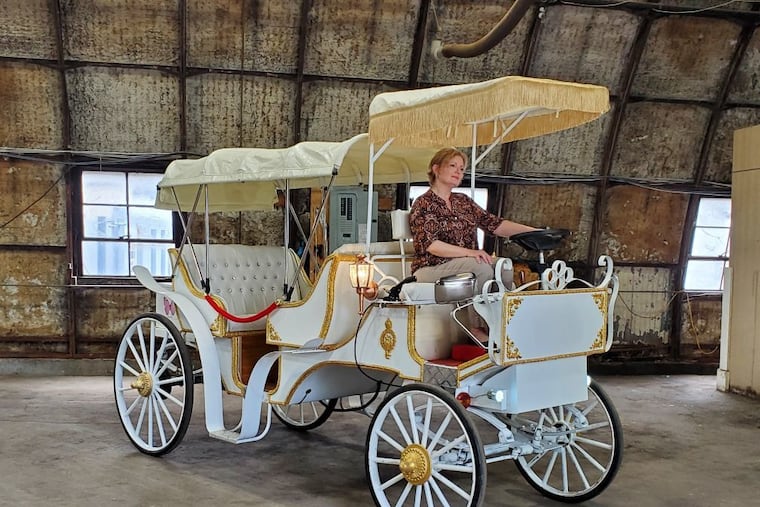Philly’s first electric horseless carriage will make a July 4 debut. Her name is Caroline.
The horseless carriage is named after Caroline Earle White, a pioneering 19th century Philadelphia animal activist.

New Orleans had a streetcar named Desire, but soon Philadelphia will be able to boast a horseless carriage named Caroline.
The city’s first electric horseless carriage will make its debut during July Fourth′s Salute to America Independence Day Parade.
Its first official passengers will be City Councilmember Mark Squilla and Janet White, an activist who fought for years to ban horse-drawn carriages in Philadelphia and replace them with electric carriages. Earlier this year, the city’s last carriage company pulled its horses from the streets and cleared out its stables. Squilla has supported White’s efforts.
“I’m so happy that finally this has all come to fruition,” said White, director of Carriage Horse Freedom in Philadelphia. “It’s been a lot of work and a lot of people involved, but it’s been a labor of love. I want to present this carriage to the city, saying, we don’t need animals working for us to have a good time. This is a viable alternative.”
White said she hopes to make the carriage a permanent part of the city by the end of 2023. On Tuesday, it will only be seen in the parade along Market Street.
White, who had purchased the carriage earlier this year, said she is still finalizing approvals from the state Department of Transportation and speaking to various local tour companies interested in using the horseless carriage.
One definite, she said Monday, is Old City’s American Vegan Center and its Veg History Tours.
“It certainly has great thematic resonance with my history tours,” said Vance Lehmkuhl, center director, “which talk about the history of U.S. vegetarianism and veganism from the standpoint of Philadelphia which is where both the U.S. vegetarian movement and modern vegan movement started.”
Currently, the vegan center operates a walking tour, but with the electric carriage, they could cover more ground and even more history, said Lehmkuhl.
The horseless carriage’s moniker has historic import as well for the City of Brotherly Love and, more recently, the burg of equine liberation.
Philly’s new electric carriage is named for Caroline Earle White. A 19th century animal activist, (and no relation to Janet White), the Philadelphia Quaker gentlewoman was the daughter of an abolitionist and a relative of suffragist Lucretia Mott, causes she also supported. White was a founder of the American Anti-Vivisection Society, which opposes the use of animals in scientific testing and worked for the creation of the Pennsylvania Society for the Prevention of Cruelty to Animals.
However, since White was a woman, she was prevented from serving on the society’s board. So she helped lead a group of other women to form their own organization in 1869 now known as the Women’s Animal Center. Located in Bensalem, its website calls itself “America’s first animal shelter.”
White also was a friend of horses in her time, greatly troubled by the cruelty and overworking she saw them subjected to in the streets of her home city. Her organization had water troughs installed to provide them with relief that are still present on some Philadelphia streets.
Cathy Malkemes, CEO of the Women’s Animal Center, said White would have been pleased to have the horseless carriage bear her name.
“Anything that helps animals, she would certainly support,” Malkemes said. “She loved animals. It was 1869 when our organization was founded. That was 50 years before women had the right to vote. She was advocating for animals before she herself had a voice in our democracy.”